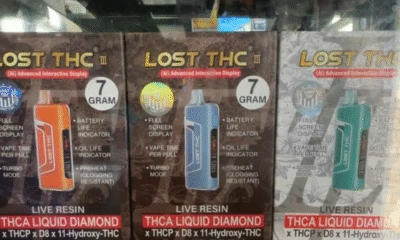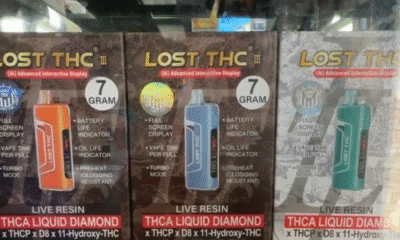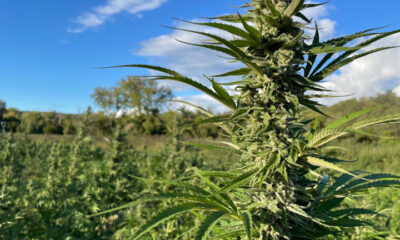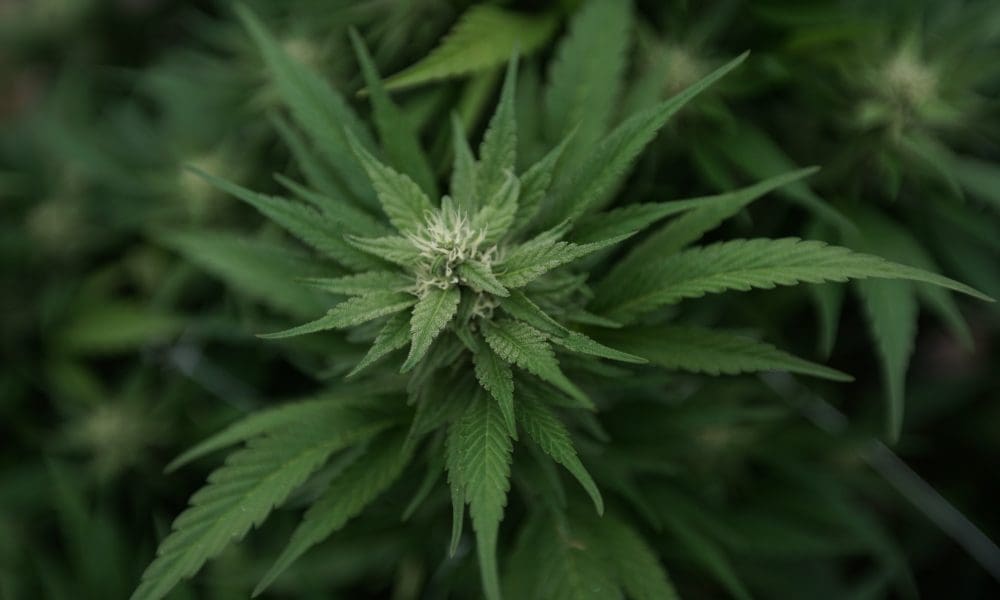featured
DEA Judge Sides With Agency On Proposal To Ban Two Psychedelics Despite Challenge From Scientific Researchers
Published
1 month agoon

A Drug Enforcement Administration judge has formally sided with the agency in its attempt to ban two psychedelic compounds that researchers say hold significant therapeutic potential, recommending that they be placed in Schedule I of the Controlled Substances Act (CSA).
In a ruling on Friday, DEA Administrative Law Judge (ALJ) Paul Soeffing said he advised the agency to move forward with its plan to place the psychedelics—2,5-dimethoxy-4-iodoamphetamine (DOI) and 2,5-dimethoxy-4-chloroamphetamine (DOC)—in Schedule I.
This follows administrative hearings where researchers and advocates, including Panacea Plant Sciences (PPS) and Students for Sensible Drug Policy (SSDP), have fought against DEA to ensure that the psychedelics can continue to be utilized in research.
But in the 118-page ruling, Soeffing ultimately said that “the record contains substantial evidence regarding the eight factors required for consideration under 21 U.S.C. § 811(c) to support recommending the scheduling of DOI and DOC,” referring to an administrative standard for determining the health risks and benefits of substances before when placing them in the CSA.
“Furthermore, I find that the record contains substantial evidence regarding the three factors required for consideration under 21 U.S.C. § 812(b)(1) to support recommending the placement of DOI and DOC in Schedule I,” he said, adding that the fact that the United Nations put DOC specifically on its own controlled substances list justifies its prohibition.
The bulk of the recommendation, which must be approved by the DEA administrator before potentially being codified, recounts the competing arguments between DEA and organizations opposing the scheduling action. But this ruling could reignite an ongoing legal challenge that PPS levied against the agency, challenging the fundamental constitutionality of the ALJ proceedings in drug scheduling rulemaking.
“It’s not a surprise that a DEA employee would side with the DEA,” PPS CEO David Heldreth told Marijuana Moment on Friday. “We find that the supposed impartiality of the judge is highly questionable due to that, and we plan to appeal this ruling and continue our lawsuit against the DEA.”
SSDP was among stakeholders who requested the psychedelics hearing in the first place, in hopes of challenging what they view as a lack of evidence justifying DEA’s proposed ban. Researchers have pointed out that DOI and DOC, as currently unscheduled substances, have been key components in psychedelics research that show potential in the treatment of anxiety and depression, for example.
Researchers have also argued that DEA has failed to meet the statutory burden of demonstrating that either psychedelic compound has high abuse potential. There are no documented cases in medical literature of “distressing responses or death” related to human consumption of DOI, nor has there been any established evidence of a high risk of dependence, SSDP said in a pre-hearing filing in July.
The initial scheduling of the administrative hearing on DOI and DOC came about two months after a federal court dismissed the case challenging the constitutionality of DEA’s process for adjudicating scheduling actions as the agency has pursued the ban the two psychedelic compounds.
DEA first attempted to ban DOI and DOC in 2022, only to withdraw the proposal amid pushback from the scientific community. The agency separately withdrew from a proposal to ban five different tryptamine psychedelics in 2022.
In 2023, DEA announced that it would be trying to enact the DOC and DOI ban again. The agency’s notice about the scheduling proposal still lacks evidence that directly connects the compounds to serious adverse health events or demonstrated a high abuse potential.
“To date, there are no reports of distressing responses or death associated with DOI in medical literature,” it said. “The physiological dependence liability of DOI and DOC in animals and humans is not reported in scientific and medical literature.”
DEA said that anecdotal reports posted by people online signaled that the substances have hallucinogenic effects, making it “reasonable to assume that DOI and DOC have substantial capability to be a hazard to the health of the user and to the safety of the community.”
It did point to one report of a death of a person who had used DOC in combination with two other unspecified drugs—as well as two reports of hospitalizations that it said were attributable to the use of DOC with other drugs—but scientists say that hardly constitutes reason enough to place them in the most strictly controlled schedule.
Kat Murti, executive director of SSDP, said in a press release on Monday that the timing of the DEA ALJ’s new recommendations, which coincided with World Psychedelics Day, is “no coincidence.”
“The DEA has relied on similar shady tricks throughout this process—such as announcing their intent to schedule these substances during the winter holidays in 2023 after withdrawing their 2022 attempt, which SSDP also opposed,” she said. “Their strategy throughout has been to try to sneak this ruling by unnoticed because they know the American public and anyone who cares about public health is on our side.”
“DOI and DOC are crucial tools for understanding how serotonin works in the body,” Murti said. “By adding them to Schedule I, the DEA is forcing medical science into the dark ages.”
Alaina Jaster, who has a PhD in pharmacology and Toxicology and serves as co-chair of SSDP’s Science Policy Committee, said the DEA judge’s decision is “disappointing and the almost 120-page record seems to reflect a very different reality than the one I experienced on the stand” when testifying in the case.
“Despite the stipulations of fact that themselves state there is no documented use of DOI, no deaths or overdose, no diversion, and it’s impossible to know whether anecdotal reports which the DEA rely upon actually contain DOI, the administrative judge has recommended placing DOI/DOC in schedule I,” she said. “As someone who has extensively studied the pharmacodynamics and pharmacokinetics of DOI and related psychedelics, it’s baffling to me that the government is going after DOI/DOC.”
In the background of this latest development, proceedings on a proposed rule to move marijuana from Schedule I to Schedule III have stalled amid challenges from witnesses in the administrative hearings. Those hearings are being overseen by a different DEA ALJ, John Mulrooney.
Amid the stalled marijuana rescheduling process that’s carried over from the last presidential administration, congressional researchers are reiterating that lawmakers could enact the reform themselves with “greater speed and flexibility” if they so choose, while potentially avoiding judicial challenges.
Meanwhile, last month a Senate committee advanced the confirmation of Terrance Cole to become the administrator of DEA amid the ongoing review of a marijuana rescheduling proposal that he’s refused to commit to enacting.
Cole—who has previously voiced concerns about the dangers of marijuana and linked its use to higher suicide risk among youth—said he would “give the matter careful consideration after consulting with appropriate personnel within the Drug Enforcement Administration, familiarizing myself with the current status of the regulatory process, and reviewing all relevant information.”
However, during an in-person hearing before the Judiciary Committee in April, he said examining the rescheduling proposal will be “one of my first priorities” if he was confirmed for the role, saying it’s “time to move forward” on the stalled process—but again without clarifying what end result he would like to see.
“I’m not familiar exactly where we are, but I know the process has been delayed numerous times—and it’s time to move forward,” he said at the time. “I need to understand more where [agencies] are and look at the science behind it and listen to the experts and really understand where they are in the process.”
Cole also said he feels it’s appropriate to form a “working group” to look at the federal-state marijuana law disconnect in order to “stay ahead of it.”
Read the DEA ALJ’s ruling and recommendation on the psychedelics ban below:
Image courtesy of Students for Sensible Drug Policy.

Author: mscannabiz.com
MScannaBIZ for all you Mississippi Cannabis News and Information.
You may like
-


Mississippi AG takes aim at hemp products, including Delta THC | TN State News
-


Mississippi AG takes aim at hemp products, including Delta THC | State
-


Weed Jobs Are the Happiest Jobs in America, Says New Report
-


New York cannabis board approves 52 new licenses, pushes total to 1,851
-


The Maricopa County Sheriff; cannabis in Arizona | Newsmaker
-


Missouri Marijuana Regulators Have Completed About Half Of 16,000 Industry Workers’ Background Checks
featured
Weed Jobs Are the Happiest Jobs in America, Says New Report
Published
11 hours agoon
July 27, 2025
You know what actually makes people happy at work?
Spoiler: it’s not cubicles, khakis, or back-to-back Zoom calls about absolutely nothing. It’s cannabis.
According to the 2025 Shift Pulse Report, a juicy data drop from Deputy, a platform tracking how America’s hourly workers actually feel, the happiest people punching the clock are in the marijuana business. Yep, weed wins again.
Based on over 1.5 million anonymous surveys collected between April 2024 and April 2025, the report ranks employee sentiment across industries and states. The top dog? A curious category labeled “Tobacco, E-Cigarette & Marijuana,” a strange corporate ménage à trois of vice, vapor and vibe.
A whopping 91.87% of shift workers in that bundle said they felt good or amazing at the end of their day.
But here’s the kicker: the report never explains why these wildly different sectors, with opposite reputations, regulatory frameworks and cultural roots, are grouped together. Cannabis is still federally illegal and rooted in wellness, activism and counterculture. Tobacco? Let’s just say it has a very different legacy.
So… are we witnessing a “cannabis happiness effect”? Or is weed just being dragged into a smoky backroom with Marlboro and Juul?
Either way, that number beats out coffee shop workers (89.73%), gym staff (89.28%) and even dental assistants (89.53%).
So why are cannabis workers so damn happy?
Let’s be real. It’s not just the product (although, yeah… it probably helps).
The cannabis industry is still relatively young. That means operators are building companies from scratch, often with a focus on culture, wages, purpose and respect. Many cannabis companies are founded by people who hated their old jobs. They remember what it’s like to be mistreated, underpaid or ghosted by management. And they try not to repeat the cycle.
Also, there’s something deeply satisfying about working in weed. It’s medicine, it’s wellness, it’s culture, it’s rebellion, it’s healing. You don’t need an MBA in employee retention to figure out that people stick around when they believe in what they’re doing and when they’re not getting yelled at by customers over expired coupons.
From burnout to blunt-force joy
Compare that to the bottom of the list. Shift workers in Pharmacies, Postal Services, Hospitals and Doctors’ Offices reported some of the highest levels of stress, frustration and unhappiness.
Turns out, stuffing prescriptions behind bulletproof glass or sprinting through 12-hour ER shifts during a poly-crisis is not a vibe. One in seven pharmacy workers said they’re unhappy. In North Dakota, the unhappiest state in the rankings, 20% of shift workers clock out mad. That’s one in five folks going home grumpy.
Meanwhile, in cannabis shops across the U.S., budtenders are smiling through the haze, stocking shelves of terpy goodness, educating curious customers and probably listening to really good playlists.
Not just a stoner stereotype
Before you say, “Well, yeah, they’re high,” hold up.
This report is based on real-time, end-of-shift surveys. These are people who just worked a full day on their feet. They hit a button that says “Good” or “Amazing” before heading home; not because they’re baked, but because they feel supported. And that’s rare.
Whether it’s better scheduling, chill team vibes or the sense that they’re building something meaningful, cannabis workers are outpacing the rest of the economy in morale. It’s proof that legalization doesn’t just benefit patients and consumers; it’s changing lives inside the industry too.
Takeaways for the rest of the working world?
Maybe it’s time to stop asking “How do we make workers happier?” and start asking “Why aren’t we more like the cannabis industry?”
More flexibility. More purpose. More transparency. More respect. Oh yeah… and fewer khakis.
Photo: Shutterstock

Author: mscannabiz.com
MScannaBIZ for all you Mississippi Cannabis News and Information.
featured
Missouri Marijuana Regulators Have Completed About Half Of 16,000 Industry Workers’ Background Checks
Published
15 hours agoon
July 27, 2025
“It is a case-by-case analysis and can’t simply be determined by a checklist of potential offenses.”
By Rebecca Rivas, Missouri Independent
Missouri cannabis regulators say they’re halfway through getting fingerprint background checks for about 16,000 marijuana workers and volunteers who didn’t get them between 2022 and 2024.
Anyone who wants to work in the cannabis industry must get an “agent ID badge” through the Missouri Division of Cannabis Regulation (DCR), which is when the background check normally occurs.
Since the division began doing the retroactive fingerprint checks in February, the number of agent IDs has declined by 2,400—going from 21,132 in February to 18,737 in June, according to the division’s data and reports webpage.
Lisa Cox, spokeswoman for the Missouri Department of Health and Senior Services, said only 17 people have had their agent IDs revoked because the fingerprinting process showed a disqualifying felony offense on their criminal record, as of July 15.
The vast majority, or 2,032 active agent IDs, have been “revoked due to non-submission of fingerprints,” Cox said. “Those who have been revoked for non-submission of fingerprints may reapply and should contact DCR directly for assistance with this request.”
When the state legalized medical marijuana in 2018, fingerprint background checks had been a requirement to apply for an agent ID card to work in the cannabis industry.
That mandate lasted until December 2022, when the recreational marijuana constitutional amendment went into effect and only required owners of cannabis companies to get fingerprinted. Other employees had to attest to not committing disqualifying offenses.
In 2023, Missouri lawmakers passed a bill to once again require all employees, contractors, owners and volunteers to submit their fingerprints to the Missouri Highway Patrol for a criminal background check.
However, it took until October 2024 for the FBI to approve the division’s statutory authority to review state and federal criminal background records, Cox said.
Since February, the division has been sending emails to individuals with agent ID cards approved between December 8, 2022 and December 1, 2024.
“Our request process is based on the date that the ID card was approved,” said Shayna Arndt, the division’s section director of patient and application services, during the July DCR Out Loud podcast. “We have sent out a message to the impacted agents and designated contacts for all facilities for the summer.”

The constitution states that people with a “disqualifying felony” can’t work in the industry, and that’s broadly defined as any violation of a state or federal law designated a felony under Missouri law.
According to the division, a lot of their review is subjective.
“What is written into law is then applied to each individual record, so it is a case-by-case analysis and can’t simply be determined by a checklist of potential offenses,” Cox told The Independent previously.
In the constitution, there is an exception for marijuana offenses eligible for expungement, and a time limit for other offenses.
An applicant can obtain an agent ID if they committed a non-violent offense more than five years ago and served no prison time. For other felonies, “more than five years have passed since the person was released from parole or probation, and he or she has not been convicted of any subsequent felony criminal offenses,” it states.
Every state handles background checks differently because the federal government doesn’t regulate the marijuana industry in any way, as it’s federally illegal.
Before the fingerprinting requirement went back into effect in December 2024, people could have their agent IDs approved and get to work within a 48-hour time period, said Christy Essex, who runs the largest Missouri-based cannabis staffing company, Se7en Staffing & Employment Solutions.
Now, it takes about 7-10 days. Essex believes that turnaround time could be faster if there were more state-approved facilities offered.
Despite the longer wait time, Essex said, “it’s definitely for the greater good to keep employees safe, the facilities safe, and the industry safe.”
This story was first published by Missouri Independent.
Photo courtesy of Chris Wallis // Side Pocket Images.

Author: mscannabiz.com
MScannaBIZ for all you Mississippi Cannabis News and Information.
featured
Pennsylvania Lawmakers And Activists Agree On Legalizing Marijuana, But Differ On What Business Model Is Best
Published
16 hours agoon
July 27, 2025
“We’re just trying to get it done, whatever that path looks like.”
By Ian Karbal, Pennsylvania Capital-Star
Cannabis legalization is sparking a big debate in Harrisburg.
In less than two weeks, three sets of lawmakers, including members of both parties, have proposed legislation that would legalize recreational marijuana in Pennsylvania. The discussion follows on the heels of a Democratic-led effort in May that passed the state House before being rejected in the Republican-controlled Senate.
The moves come as lawmakers push further past their June 30 deadline to deliver a state budget, and the commonwealth faces a deficit. That is unless legislators cut services or find new revenue.
But Senate Majority Leader Joe Pittman (R-Indiana) has said it’s unlikely legal cannabis emerges as part of a final budget deal.
As a heavily regulated industry, any cannabis bill ultimately signed into law could significantly shape the business landscape in Pennsylvania, and determine who stands to benefit from it.
For some, it’s a chance to help disproportionately impacted communities rebuild after years of disinvestment and incarceration. A 2020 study conducted by the American Civil Liberties Union found Black Pennsylvanians were more than three times as likely as whites to be charged for cannabis-related crimes, despite surveys reporting roughly the same rate of use of the drug.
For others, the nascent cannabis industry is an opportunity for small business owners to get into one of the fastest-growing industries globally while it’s still in its early days.
Both arguments have been central to a series of pro-legalization pushes in Harrisburg over the last year, echoed by the industry, lawmakers and grassroots advocates.
“Legalizing adult-use cannabis is no longer just a smart option—it’s a fiscal and moral necessity,” said Brit Crampsie, a spokesperson for the cannabis industry trade group Responsible PA, following the introduction of a bipartisan bill in the state Senate. “Pennsylvania is staring down a massive budget shortfall, and this legislation offers a real solution: new revenue, safer communities, support for small businesses and long-overdue justice. Lawmakers must act now.”
Rep. Emily Kinkead (D-Allegheny), the Democratic sponsor of a bipartisan House bill said in a statement, “we’re talking about creating thousands of jobs, generating billions in revenue, and reinvesting in our communities.”
But Pennsylvania’s medical cannabis market is already dominated by so-called multi-state operators, many of which are among the largest cannabis companies in the country. Looking at Pennsylvania’s most recent proposals, it’s unclear if their impacts can measure up to the lofty promises made by proponents.
In the weed(s) on permitting
When New Jersey legalized recreational marijuana in 2021, Tahir Johnson, 41, was ecstatic. The bill signed into law was intended to help people like him, who had previous cannabis charges, enter the legal market on the ground floor. And he already had dreams of running a dispensary in his hometown of Trenton.
Johnson, who had a background in finance and was working in Maryland’s nascent cannabis industry, was one of the first 11 candidates to have a dispensary license approved through New Jersey’s equity licensing program. The initiative created a priority application process for people with cannabis convictions or from economically disadvantaged communities.
Johnson checked both boxes.
“It allowed me to raise capital, get a good location and all those things,” Johnson said of the state’s equity program.
But it didn’t take long for road blocks to arise. First, there was the problem of financing. Most major banks are hesitant to give out loans to cannabis businesses because it’s still federally illegal. Then, there were local regulators.
By the time his dispensary finally opened last year, more than two years after he first received his license, the market was dominated by vertically integrated cannabis companies with more financing and experience after making millions in other states.
While his business is growing and about to hit its one-year anniversary, Johnson believes he’s one of the lucky ones, and that many would-be entrepreneurs like him were simply locked out of the market. But despite the setbacks he faced, he believes there’s a lot that Pennsylvania can learn from New Jersey, for better and for worse.
According to a 2025 report, while 17 percent of cannabis-related business licenses in New Jersey have gone to majority-Black owned businesses, only 10 percent of the state’s dispensaries are Black-owned. That number is higher than many other states with legal cannabis programs, including those that have attempted to institute equity programs. It’s also double the national rate, where less than 5 percent of cannabis business owners identify as Black.
Looking at the current proposals in Pennsylvania, Johnson took issue with the approach to social equity in Senate Bill 120, which was introduced last week by Sens. Dan Laughlin (R-Erie) and Sharif Street (D-Philadelphia). Rep. Amen Brown (D-Philadelphia) announced plans to introduce an identical bill in the state House.
Street, the bill’s primary Democratic champion in the Senate, said social equity through investment in communities hit hardest by prohibition is one of the guiding principles behind the legislation. Though these measures are exactly where Johnson and other advocates for minority participation in the cannabis industry say it falls short.
The measure sets aside 15 dedicated business licenses in the first year for businesses owned by Pennsylvanians from what it calls “disproportionately impacted areas.” Those are defined by poverty rates and economic indicators, like how many families receive food assistance.
Small businesses owned primarily by people from these areas would have to pay a $50,000 non-refundable fee in order to apply for a business license—half the price non-qualifying businesses would be charged. In order to have an application approved, they’d also have to show that they either own or control the real estate where they plan to open their dispensary.
Because of how New Jersey’s law was written, Johnson didn’t have to put up money or buy property before his business application could be approved. If he’d had to meet the requirements set out in Senate Bill 120, Johnson isn’t sure he would have been able to get to where he is.
“There may be some folks who have $50,000, but I think the people that they’re intending to help will not,” he said. “I think setting that high of a barrier also opens those people up to predatory businesses, where you may have some people who have sold their whole business just to get the funds for their application.”
Johnson also took issue with Senate Bill 120’s approach to licensing for existing medical dispensaries.
An analysis of state Department of Health data shows that nearly all of the 190 licensed medical dispensaries currently selling cannabis in Pennsylvania are owned by multi-state organizations, including some of the country’s largest cannabis companies
Companies like Cresco Labs, Curaleaf and Green Thumb Industries, which all own multiple medical dispensaries in the state, have a hand in growing, manufacturing and selling marijuana products, and have market caps over a billion dollars.
With cannabis federally illegal, even large companies generally have to grow cannabis in the states they sell it. If that were to change, however, cultivation could be consolidated in a handful of locations.
Senate Bill 120 would allow those companies to apply for permits to convert their medical dispensaries for recreational sale, and let their parent companies open up to 24 locations in Pennsylvania.
Johnson worries that small business owners won’t be able to get dispensaries off the ground until the state’s recreational cannabis market is dominated by the companies that already control the medical market.
When he first received one of the first licenses, 12 medical operations run by multi-state companies were allowed to begin recreational sales. By the time he was able to open his small business, they had dozens of locations.
“That was the biggest thing that’s really impacted my trajectory,” Johnson said.
Street defended his bill’s approach, noting it allows the state to offer low-interest loans and grants to qualifying entrepreneurs. The proposal does not clarify whether those state-backed, low- or zero-interest loans could be used on a business application itself or a real estate purchase for a business that hasn’t received a license. But a spokesperson for Laughlin said it’s something the state could decide to allow if it’s necessary.
“We wanted to be able to create opportunities for a disadvantaged community,” Street said.
Rep. Amen Brown (D-Philadelphia), who announced plans to introduce an identical bill in the House, acknowledged there were shortcomings in the measure’s approach to social equity for would-be business owners.
However, he said any legalization bill has to pass the Republican-controlled Senate. If no proposal passes, that means no small business opportunities for anyone. And, maybe more importantly, it would mean no expungement of cannabis charges and no new revenue for the state, which is facing spending cuts.
“You can’t go so far to where you turn folks off,” he said. “I support our bill because we believe it’s a fair piece that Senate Republicans can agree to.”
House Bill 120, introduced by Kinkead and Rep. Abby Major (R-Armstrong), takes a similar, but slightly different approach to equity.
It sets aside 60 so-called equity licenses for people from areas most impacted by prohibition. What counts as a disproportionately impacted area will be left up to a new cannabis board made up of appointees, but the measure suggests considering the relative rate of cannabis arrests and charges. These licenses could also go to businesses owned by veterans or with 75 percent control by people who have been arrested for non-violent cannabis charges or have family who have.
Application fees would be waived for these businesses and, unlike anyone else applying for a dispensary license, they would only have to prove they have an option to buy or lease the real estate where they plan to operate. That would significantly lower the initial investment for qualifying business owners.
“The first licenses that go out are for social equity,” Kinkead said. And she stressed that the bill, like others, would establish a clean slate program for people with existing cannabis charges.
The bill would also allow existing medical dispensaries to apply to become recreational sellers, but they couldn’t expand beyond their existing locations on the same license.
Major, the bill’s Republican co-sponsor, acknowledged that some of the differences in approach may come down to the caucuses that the bills’ lead sponsors belong to in their respective chambers.
“We’re just trying to get it done, whatever that path looks like,” she said.
The state store approach
A third approach to legalizing cannabis narrowly passed the Democratic-controlled House on party lines in May, before facing bipartisan rejection in a Senate subcommittee.
It would have seen cannabis sold in state stores, like liquor, effectively eliminating private dispensaries from the picture.
The bill faced strong pushback from the state’s medical cannabis industry.
It was also greeted with skepticism by grassroots advocates, who say any legalization bill must include support for entrepreneurs most affected by policies dating back to the war on drugs era.
“I’m totally opposed to a state store model because of the limitations it presents for equity and small, independent businesses,” said Cherron Perry-Thomas, founder of the Diasporic Alliance for Cannabis Opportunities, an organization that promotes Black participation in the cannabis industry.
Perry-Thomas also stressed that, even though she finds Street and Laughlin’s bill a step forward, ideally a bill establishing a private store model should include broader support for business owners impacted by the war on drugs.
But the state store bill’s sponsors, Reps. Dan Frankel (D-Allegheny) and Rick Krajewski (D-Philadelphia), emphasized it would also have provided opportunities for small businesses owners to grow and deliver cannabis, or to establish marijuana lounges and bars.
If we want a cannabis industry that actually serves small businesses and communities harmed by prohibition, we can’t copy the failures of other states. Important read from @PennCapitalStar: https://t.co/5JiM8ZwdeE
— State Rep. Dan Frankel (@RepDanFrankel) July 17, 2025
Frankel said that, in states that have already legalized, small businesses that grow cannabis or manufacture products like edibles have had a hard time competing with national companies, or even getting their products on the shelves at some of the larger chain dispensaries.
State stores, he said, would be able to purchase and feature products grown and manufactured by small Pennsylvania businesses, and could set minimum prices that would allow them to be more competitive.
“It’s really to create the basis for a market that would allow Pennsylvania farmers, growers and processors to have the opportunity to sell their products,” Frankel said. “The multi-state operators, we saw with what they’ve done in other states. No one could get products on the shelves of their dispensaries.”
But Sen. Street took issue with the state store approach.
“It’s far more expensive to start a grower/processor business than it is to start up a dispensary,” he said. “And if the government owns all the dispensaries, you’ve pretty much eliminated most of the meaningful opportunities for small business owners, whether they be Black, white or whoever.”
Ultimately, expanding the powers of the state Liquor Control Board and establishing a new set of state stores proved politically unpopular among lawmakers, who rejected the idea, and the public, according to a cannabis industry-backed poll.
Identify goals and work backwards
Beau Kilmer, the director of drug policy at the non partisan think tank, RAND Institute, said the focus on legalization as an opportunity for small cannabis businesses may be misguided.
“If one of your primary goals is to potentially build wealth in certain communities, it might make more sense to make a state store model and then designate some of that money into incubators to help those people start other businesses,” Kilmer said
That’s in part because of the volatility of the industry itself. In many states that have legalized, cannabis prices have rapidly dropped, making it harder and harder for smaller businesses to survive.
Jon Caulkins, a professor at Carnegie Mellon’s Heinz College of Public Policy, who consulted the sponsors of the state store bill, frequently used the word “roadkill” to describe what has happened to small businesses as the industry has consolidated.
“This emphasis on the little guys is a little like King Canute trying to sweep back the ocean,” Caulkins said. “The idea that [legalization is] going to lead to comfortable retirements for a lot of people who would otherwise be poor is just naive for lawmakers who believe that, and it’s disingenuous for the industry.”
He pointed to states like California and Colorado, among the first to legalize recreational cannabis. They’ve seen their markets dominated by large, vertically-integrated and private equity-backed cannabis companies.
“The dominant story now is people who put their life’s savings into investing in this business are going bankrupt,” Caulkins said.
For both Kilmer and Caulkins, none of that is to say lawmakers shouldn’t legalize cannabis, but they emphasized lawmakers should consider their ultimate goals and work backwards.
Both stressed there are other ways to help communities that have seen a disproportionate number of cannabis arrests. That includes expunging previous cannabis charges, which all three recent proposals provide for on some level.
“From the general public policy perspective, the meat and potatoes and the guts of the policy proposal matter way more,” Caulkins said, referring to the emphasis on opportunities for small business. “If we look at the part of legalization that may eliminate criminal records of people who have been convicted in the past of cannabis violations in Pennsylvania, that’s gonna benefit tens of thousands of people.”
This story was first published by the Pennsylvania Capital-Star.
Photo courtesy of Chris Wallis // Side Pocket Images.

Author: mscannabiz.com
MScannaBIZ for all you Mississippi Cannabis News and Information.

Mississippi AG takes aim at hemp products, including Delta THC | TN State News

Mississippi AG takes aim at hemp products, including Delta THC | State

Weed Jobs Are the Happiest Jobs in America, Says New Report

New York cannabis board approves 52 new licenses, pushes total to 1,851

The Maricopa County Sheriff; cannabis in Arizona | Newsmaker

Missouri Marijuana Regulators Have Completed About Half Of 16,000 Industry Workers’ Background Checks

Pennsylvania Lawmakers And Activists Agree On Legalizing Marijuana, But Differ On What Business Model Is Best

Rhode Island Officials Pause New Hemp Retailer Licenses As They Study Sales Of THC Drinks In Liquor Stores And Bars

Broader Launch Of Minnesota’s Marijuana Retail Market Is Almost Here, State Officials Say

Bipartisan Coalition Of 32 Attorneys General Pushes Congress To Urgently Pass Marijuana Banking Bill

Marijuana And CBD Provide ‘Significant Symptom Relief’ For Inflammatory Bowel Disease Patients, Federally Funded Study Finds

Doctor Who Allegedly Said ‘I Wonder How Much This Moron Will Pay’ Pleads Guilty

Killing reported at Oklahoma marijuana grow operation

Texas Voters Want Synthetic THC Outlawed, Poll Shared By Proponents Of Reining In Hemp Industry Finds

Judge rejects No Savage’s rap culture argument – NBC4 Washington

California Moves to Ban Hemp Wellness Products — And the Weed Nuns Are Fighting Back

Cannabis & Psychedelics Reported Most Effective Non-Prescription Drugs by Eating Disorder Patients

Kentucky Governor Urges Trump To Oppose Bill Blocking Marijuana Rescheduling That’s Advancing In Congress

New York cannabis board approves 52 new licenses, pushes total to 1,851

South Park Loves Marijuana – The Fresh Toast

Lo Más Reciente de High Times en Español

DEA Judge Overseeing Cannabis Rescheduling Process Retires

GOP Senator Threatens To Block Spending Bill If Hemp THC Product Ban Stays In, Sources Say

The Best Delicious Summer Cocktails

Alert: Department of Cannabis Control updates data dashboards with full data for 2023

Connecticut Appoints The US’s First Cannabis Ombudsperson – Yes there is a pun in there and I’m Sure Erin Kirk Is Going To Hear It More Than Once!

5 best CBD creams of 2024 by Leafly

EU initiative begins bid to open access to psychedelic therapies

Free delta-9 gummies from Bay Smokes
New Study Analyzes the Effects of THCV, CBD on Weight Loss

5 best autoflower seed banks of 2024 by Leafly

May 2024 Leafly HighLight: Pink Runtz strain

Curaleaf Start Process Of Getting Their Claws Into The UK’s National Health System – With Former MP (Resigned Today 30/5/24) As The Front Man

Mississippi city official pleads guilty to selling fake CBD products

Discover New York’s dankest cannabis brands [September 2024]

Horn Lake denies cannabis dispensary request to allow sale of drug paraphernalia and Sunday sales | News

Local medical cannabis dispensary reacts to MSDH pulling Rapid Analytics License – WLBT

Press Release: CANNRA Calls for Farm Bill to Clarify Existing State Authority to Regulate Hemp Products

Nevada CCB to Accept Applications for Cannabis Establishments in White Pine County – “Only one cultivation and one production license will be awarded in White Pine County”

5 best THC drinks of 2024 by Leafly

The Daily Hit: October 2, 2024

6 best CBD gummies of 2024 by Leafly

5 best delta-9 THC gummies of 2024 by Leafly

Weekly Update: Monday, May 13, 2024 including, New Guide for Renewals & May Board meeting application deadline

People In This State Googled ‘Medical Marijuana’ The Most, Study Shows

PRESS RELEASE : Justice Department Submits Proposed Regulation to Reschedule Marijuana

Thailand: Pro-cannabis advocates rally ahead of the government’s plan to recriminalize the plant

Press Release: May 9, STIIIZY and Healing Urban Barrios hosted an Expungement Clinic & Second Chance Resource Fair
Trending
-

 California Cannabis Updates1 year ago
California Cannabis Updates1 year agoAlert: Department of Cannabis Control updates data dashboards with full data for 2023
-

 Breaking News1 year ago
Breaking News1 year agoConnecticut Appoints The US’s First Cannabis Ombudsperson – Yes there is a pun in there and I’m Sure Erin Kirk Is Going To Hear It More Than Once!
-

 best list12 months ago
best list12 months ago5 best CBD creams of 2024 by Leafly
-

 Business10 months ago
Business10 months agoEU initiative begins bid to open access to psychedelic therapies
-

 Bay Smokes1 year ago
Bay Smokes1 year agoFree delta-9 gummies from Bay Smokes
-

 cbd1 year ago
cbd1 year agoNew Study Analyzes the Effects of THCV, CBD on Weight Loss
-

 autoflower seeds10 months ago
autoflower seeds10 months ago5 best autoflower seed banks of 2024 by Leafly
-

 California1 year ago
California1 year agoMay 2024 Leafly HighLight: Pink Runtz strain

